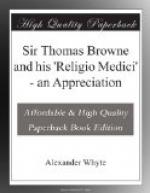* * * * *
You might read every word of Sir Thomas Browne’s writings and never discover that a sword had been unsheathed or a shot fired in England all the time he was living and writing there. It was the half-century of the terrible civil war for political and religious liberty: but Sir Thomas Browne would seem to have possessed all the political and religious liberty he needed. At any rate, he never took open part on either side in the great contest. Sir Thomas Browne was not made of the hot metal and the stern stuff of John Milton. All through those terrible years Browne lived securely in his laboratory, and in his library, and in his closet. Richard Baxter’s Autobiography is as full of gunpowder as if it had been written in an army-chaplain’s tent, as indeed it was. But both Bunyan’s Grace Abounding and Browne’s Religio Medici might have been written in the Bedford or Norwich of our own peaceful day. All men are not made to be soldiers and statesmen: and it is no man’s duty to attempt to be what he was not made to be. Every man has his own talent, and his corresponding and consequent duty and obligation. And both Bunyan and Browne had their own talent, and their own consequent duty and obligation, just as Cromwell and Milton and Baxter had theirs. Enough, and more than enough, if it shall be said to them all on that day, Well done.
‘My life,’ says Sir Thomas, in opening one of the noblest chapters of his noblest book, ’is a miracle of thirty years, which to relate were not a history, but a piece of poetry; and it would sound to common ears like a fable.’ Now, as all Sir Thomas’s readers must know, the most extraordinary criticisms and comments have been made on those devout and thankful words of his concerning himself. Dr. Samuel Johnson’s were not common ears, but even he comments on these beautiful words with a wooden-headedness almost past belief. For, surely the thirty years of schoolboy, and student, and opening professional life that resulted in the production of such a masterpiece as the Religio Medici was a miracle both of God’s providence and God’s grace, enough to justify him who had




